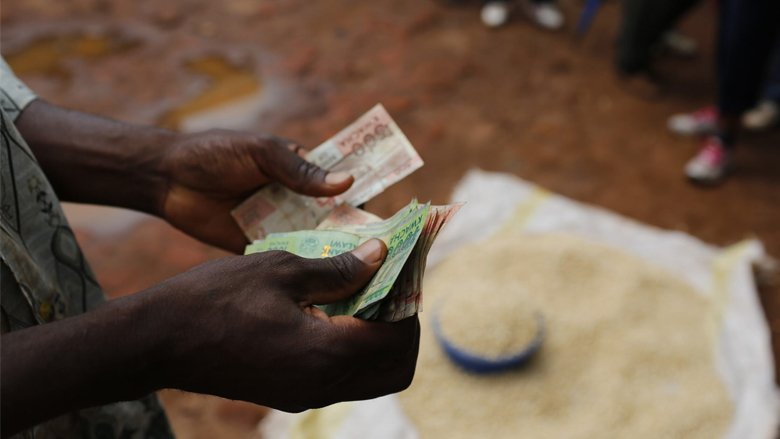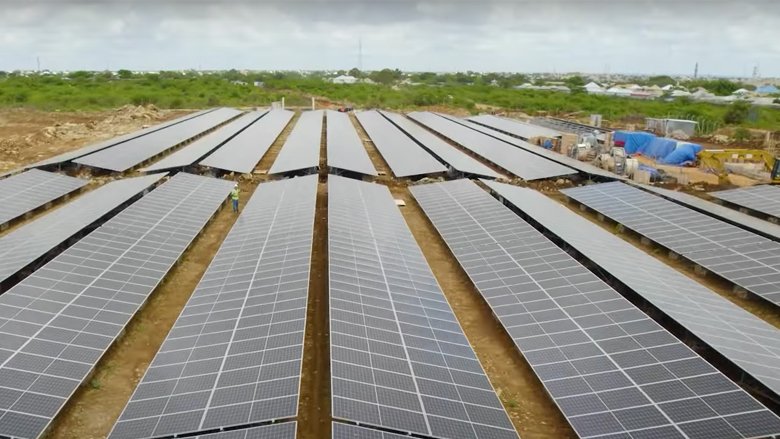New Guarantee Platform Delivers Efficiency, Simplicity to Boost Impact

A Malawian trader counts money as he sells maize near the capital Lilongwe, Malawi February 1, 2016. Photo: Shutterstock.
STORY HIGHLIGHTS
- Beginning July 1, the World Bank Group’s one-stop guarantee platform will bring together all of its guarantee products and experts.
- The platform will help provide transparency and certainty for the World Bank Group’s clients across the guarantee process, with a better client experience.
- Streamlining these offerings will help maximize the limited capital available for impactful development in emerging markets and developing economies.
In its continued efforts to work better and more efficiently with member countries and the private sector community, the World Bank Group recently announced a major overhaul of its guarantee business that will deliver simplicity, improved access, and faster execution through a new, convenient marketplace. These loan and investment guarantees can be powerful catalysts to attract private-sector investments and commercial financing, fueling economic growth and improved public services in developing countries.
Currently the World Bank, International Finance Corporation (IFC), and the Multilateral Investment Guarantee Agency (MIGA) offer some 20 guarantee solutions. But they have different processes, rules, and standards. This will change on July 1, with the launch of a new one-stop guarantee platform that will bring together guarantee experts and products from across the organization. The guarantee products will be housed at MIGA, making it easier for clients to do business with the World Bank Group.
We sat down with MIGA’s Executive Vice President Hiroshi Matano to discuss the new guarantee platform.
What is changing with guarantees at the World Bank Group?
Right now, the guarantee solutions are scattered across our institutions. They all follow different processes and our clients have to talk to each institution separately. This slows things down, impacting efficiency. We wanted to better streamline our offering to maximize the limited capital available for impactful development in emerging markets and developing economies.
Beginning July 1, the one-stop guarantee platform will bring together all of our guarantee products and experts for efficiency, simplicity, and speed. As a client, you will see a simplified menu of products and be able to deal with one team instead of multiple contacts at the World Bank, IFC, and MIGA.
Ultimately, the guarantee platform will help us achieve the goal of tripling the World Bank Group’s guarantee business to $20 billion or more by 2030.
Why is this needed in the current global context of overlapping crises?
Governments, multilaterals, and philanthropies alone do not have enough resources or funds to address the global crises currently underway in a sustainable, resilient, and inclusive way. We need to engage the private sector as development partners to fill this huge gap.
When the World Bank Group started the evolution process last year—reimagining our vision and mission, operating model, and financial capacity—there were discussions on how to better utilize our guarantees. The Private Sector Investment Lab, which was launched by the World Bank Group in June 2023 to identify barriers and potential solutions to private sector investment in emerging markets, also provided specific guidance on pain points in using our guarantee instruments. The G20 Independent Expert Group report on Strengthening Multilateral Development Banks called for an expanded use of guarantees to mitigate risk and catalyze private finance.
As a result, the platform is being launched on July 1 with the ambition of significantly increasing our issuance of guarantees.
Does this mean the World Bank Group is creating a new institution?
We are not creating a new institution, but this approach will bring together the largest group of development guarantee experts in the world. Over the next three years, the number of staff working on the guarantee platform is projected to increase by at least 30 percent, and staff working on guarantees outside of Washington, D.C., is projected to grow by 40 percent or more during the same period.
How will the new platform work?
The platform will give transparency and certainty to our clients across our guarantee process, with improved client experience. Also, World Bank Group country office staff will now have a single point of contact for any questions about guarantees, allowing them to provide seamless assistance to clients.

What are some of the key features of the new platform?
The new platform will improve access and accelerate execution by having a common approach for all guarantees and eliminating redundant processes. Currently, for example, if a project has guarantees from two World Bank Group institutions, it must go through two due diligence processes. This will be reduced to one.
It will also be a more scalable model, with a risk-weighted approach that focuses resources on high-impact projects and portfolios of projects in addition to individual projects. This will cut down on duplicative risk analysis and free up capacity to tackle more complex challenges as well as grow the business.
Finally, we will also introduce new and innovative guarantee products, which will enable the private sector to get more involved in solving the development challenges of today. With these new options, private sector clients can further expand their footprint and ambition. For example, IFC and MIGA guarantees may be bundled to cover both private and public sector risks.
What are the platform’s key focus areas?
World Bank Group guarantee products will continue to be used for transactions and projects to promote foreign direct investment and protect investors from political risk. For example, they can be used to support Sub-Saharan Africa and the poorest and fragile and conflict-affected countries to improve energy access. They can also help middle-income countries make the transition to greener energy.
How will the new platform boost economic and sustainable development?
Private capital is a must for emerging markets and developing economies (EMDEs) to grow their economies. They need billions of dollars to fill the investment gap, and multilateral development banks alone do not have the resources. The World Bank Group’s experience has shown that our guarantees go a long way in attracting private capital to EMDEs.
To mobilize additional private sector finance for development, the development community must work together to act as lenders, conveners, co-investors, and providers of de-risking solutions to private sector lenders and investors.
An important element in the overall story of engaging private capital for development is the entire World Bank Group’s efforts at various stages of our engagement with a country client. It starts with country engagement, where the World Bank provides the necessary knowledge and financial support to create an enabling environment for private capital deployment. When such conditions are met, the private sector is then able to better engage our country clients, sometimes together with the support of IFC through its advisory and equity and debt instruments. The guarantee platform, housed in MIGA, will now also be able to support the private sector through guarantees from all three institutions – the World Bank, IFC, and MIGA.
How will the new platform help countries achieve the Sustainable Development Goals (SDGs) by 2030?
We believe that deploying guarantee instruments at scale across the World Bank Group will be critical to facilitating and mobilizing more private capital to address both country priorities and global challenges. Our aim is to help clients achieve the SDGs, reach net zero greenhouse gas emissions, and address other global challenges, including pandemic preparedness, food and nutrition security, water scarcity, and energy and digital access. This new platform will be a key part of making these changes a reality.
The platform will also support the implementation of the Global Challenges Programs, harnessing the collective power of One World Bank Group to provide replicable and scalable solutions to critical global issues and achieve impact at scale. For instance, in support of energy access, the platform focuses on innovation, which will include off-grid and mini-grid solutions. A mini-grid solar project in the Democratic Republic of Congo is a great example of such collaboration across the World Bank Group to solve complex problems.
Finally, we will also leverage the platform to explore the potential application of guarantees in support of the development of carbon credit markets.





